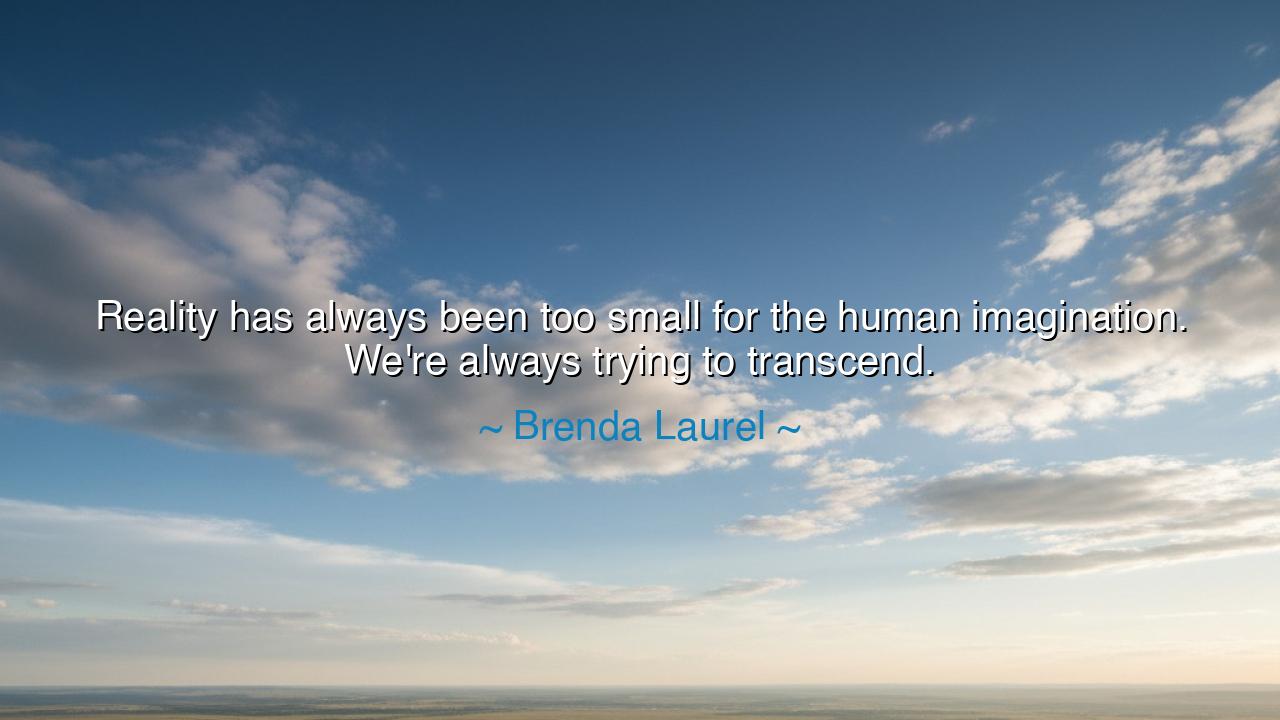
Reality has always been too small for the human imagination.
Reality has always been too small for the human imagination. We're always trying to transcend.






In the visionary words of Brenda Laurel, a pioneer of virtual worlds and digital storytelling, we hear a timeless echo of the human soul’s deepest hunger: “Reality has always been too small for the human imagination. We’re always trying to transcend.” These words are not confined to the world of technology or art — they are a reflection of the ancient striving within all of us. Since the dawn of thought, mankind has stood upon the solid earth and gazed upward, dreaming of what lies beyond. For imagination is the force that refuses to be bound, the divine spark that seeks to stretch reality until it matches the vastness of our desire.
Reality, though tangible and immediate, has never been enough for humanity. The hunter-gatherer who first painted beasts upon the walls of his cave did so because he wished not merely to record life, but to enlarge it — to make it mythic, to give form to the unseen. That was the first act of transcendence. Brenda Laurel, speaking from the frontier of modern invention, reminds us that this impulse has not faded with time. Whether we create gods, stories, machines, or worlds of code, we do so because reality, as it is, feels too narrow for the imagination’s endless reach. To live only within the confines of the visible is to deny the infinite that whispers within us.
The origin of this insight lies in Laurel’s life’s work — a bridge between art and science, between human emotion and technological innovation. As a designer of interactive media, she saw firsthand how humans use technology not to escape reality, but to expand it. She understood that when we build worlds — be they in literature, virtual reality, or philosophy — we are not rejecting truth; we are fulfilling our ancient need to transcend limitation. Her words echo not only in the digital realm but in the temples of history, where the same yearning has always burned.
Consider the story of Prometheus, the titan of old who stole fire from the gods and brought it to mankind. For this act, he was punished, bound to a rock — yet his spirit was unconquered. His gift of fire was more than warmth or light; it was imagination itself — the power to shape, to create, to rise beyond what is given. Prometheus symbolizes that eternal human defiance: the refusal to accept reality as final. From that fire came civilization, art, science, and love — all born of the same instinct to transcend the boundaries of what is. So too did Laurel recognize that our tools — from the brush to the algorithm — are but extensions of that same Promethean will.
Through the centuries, this yearning has propelled every leap of progress. The astronomers who charted the stars defied the darkness of their age; the inventors who built machines defied the limits of the body; the artists who dreamed of beauty defied the silence of the world. Even today, when we build new realities in digital form, we are not escaping life — we are continuing the human journey beyond its visible horizon. The imagination does not destroy reality; it enlarges it, revealing that truth itself is vaster than we dare to believe. Laurel’s words are not a lament for reality’s smallness, but a celebration of humanity’s vastness.
Yet there is a warning hidden in her wisdom. To transcend is not to abandon the world, but to transform it. When imagination soars without grounding in compassion or truth, it can lead to ruin. The same imagination that creates wonders can also build illusions — weapons, lies, and machines of control. Thus, the path of transcendence must be walked with reverence. We must remember that our goal is not to flee reality, but to uplift it — to infuse it with beauty, meaning, and hope. The true artist, the true innovator, does not escape the world; they remake it in the image of their highest vision.
So, my child, take this lesson to heart: let your imagination stretch beyond the edges of what is known. Do not fear to dream, to build, to question. Every act of creation is a step beyond the walls of the ordinary. But remember always to keep one hand upon the earth, for reality is the soil in which transcendence grows. Plant your roots deep in truth, and let your branches reach toward the stars.
For as Brenda Laurel teaches, the human story is one of endless expansion — the ceaseless effort of the soul to outgrow its cage. And perhaps that is the divine purpose of our kind: to be forever reaching, forever remaking, forever transcending — until reality itself becomes as vast as the imagination that dreamed it.






AAdministratorAdministrator
Welcome, honored guests. Please leave a comment, we will respond soon